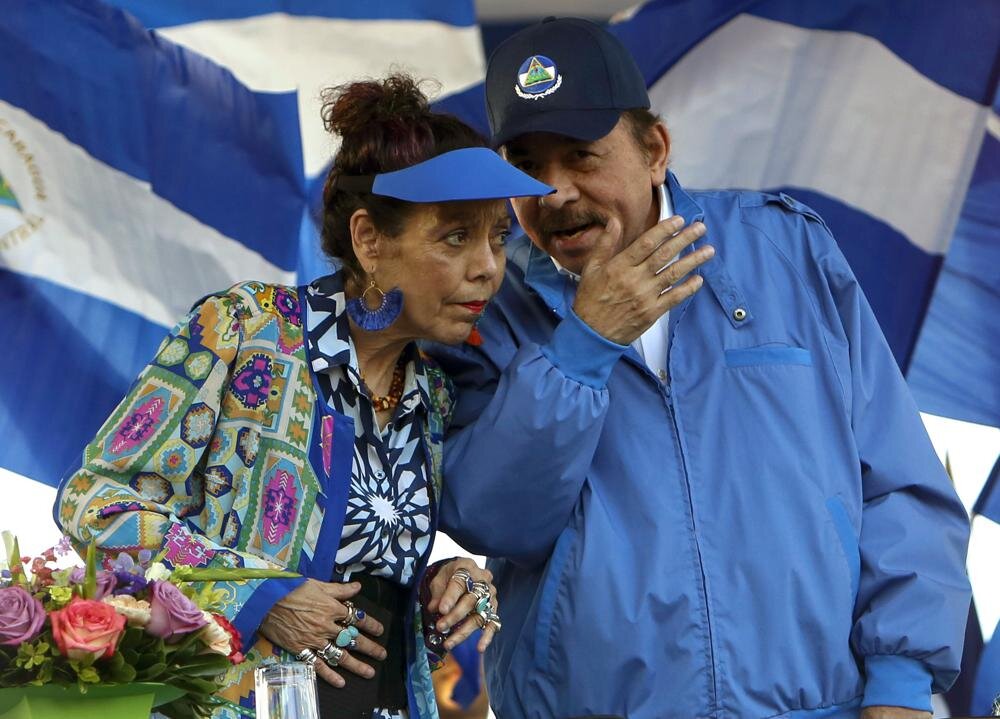Why does Nicaragua's election results anger the U.S.?

TEHRAN - Nicaragua's President Daniel Ortega has secured a fourth consecutive term in office results show, leading the United States to warn of new sanctions on the Central American country.
The country’s Supreme Electoral Council says that with almost all the ballots at polling stations counted, a preliminary tally had Ortega's Sandinista alliance winning with around 76% of votes. The turnout has been put at 65%.
In the lead up to Sunday's election, western nations, especially the United States, tried their best to portray the vote as unfair.
U.S. Secretary of State Antony Blinken says his country will work with other governments and was ready to use a range of tools, including possible sanctions, visa restrictions and coordinated actions against those it said were complicit in supporting the Nicaragua government's "undemocratic acts." Democrats in the U.S. Congress pushed for President Joe Biden to back the so-called Renacer Act that aims to intensify pressure on Ortega.
Ortega, the longest-serving leader in the Americas, hailed the election as a victory against terrorism, a victory for independence and a victory delivered by the "immense majority of Nicaraguans."
Cuba, Venezuela and Russia all offered him their backing.
Russian Foreign Minister Sergei Lavrov said U.S. calls for countries not to recognize the outcome were "unacceptable."
In 2008, Ortega's government faced massive waves of anti-government protests; and that’s where critics accuse the U.S. of inciting the unrest. Mexico's foreign ministry said it would not comment on the election until official results were posted. Mexico maintained a critical view of Ortega’s alleged jailing of opponents but backed non-intervention in Nicaragua's affairs, a Mexican official said, speaking on condition of anonymity.
Ortega, born on November 11, 1945, was raised in a middle-class family that opposed the regime of dictator Anastasio Somoza. He was a former rebel who helped topple the right-wing Somoza family dictatorship in the late 1970s, Ortega says he is defending Nicaragua against unscrupulous adversaries bent on ousting him with the aid of foreign powers.
In the 1980s, Ortega served a single term as president before being voted out. He returned to the top job in 2007 and went on to deliver solid economic growth and attracting private investment. Over the past decades, the youth and other activists abroad have been highly optimistic of Ortega's Sandinista alliance. In Europe and the Americas, they organized solidarity campaigns, fundraisers and protests to support the healthcare reform, educational programs and agricultural projects in Nicaragua.
In 2008, Ortega's government faced massive waves of anti-government protests; and that’s where critics accuse the U.S. of inciting the unrest.
Russia has previously accused the United States of “destructive” meddling in Nicaragua's affairs for using a UN Security Council meeting to address demonstrations in the Central American country.
Russian Ambassador Vassily Nebenzia described the U.S. decision to raise Nicaragua at the UN council as a "glaring and grim example of destructive foreign intervention" and accused Washington of spearheading the division in the country.
Nebenzia says "The Security Council is being transformed into something of a judge over Nicaragua. Following [the session], polarization in Nicaragua will only worsen. The initiators are indeed seeking to achieve that."
Russia has argued that the situation in the country was "stabilizing" and that differences between the government and its opponents should be resolved "through direct peaceful dialogue, with pressure from abroad”.
According to an investigation conducted by the Grayzone we also know a U.S. government-linked “Public Relations” firm ran fake news networks for right-wing Latin American regimes to bring down government’s such as that of Nicaragua.
The major American PR firm, CLS Strategies, is located just a few blocks from the White House and was caught running a large scale propaganda operation on social media. The information warfare relied on fake social media accounts and pages to spread disinformation on behalf of right-wing, U.S.-backed regimes in Latin America, while conducting covert online propaganda to destabilize the leftist governments in the region.
According to the company’s own public listings, as well as Foreign Agents Registration Act filings, CLS Strategies has worked for right-wing political forces in Nicaragua that want Ortega replaced with a regime friendly to the United States.
This controversy underscores how U.S. PR firms, elite Washington insiders, and foreign opposition groups work together to promote right-wing regimes in Latin America while creating fake news in support of the opposition to democratically elected governments.
Given the extensive links the PR firm CLS has to the Democratic Party, the scheme also highlights the bipartisan unity around regime change and support for corrupt leaders linked to death squads and drug trafficking.
The research also explains the harsh rhetoric coming out of the Biden administration and the wider Democratic Party.
One of many on the payroll of CLS Strategies is Mark Feierstein, who boasted that he “oversaw the United States Agency for International Development’s programming in the Americas as assistant administrator for Latin America and the Caribbean, a Senate-confirmed position, and later took on a global portfolio as USAID’s deputy administrator for two years.”
Feierstein previously served in the Bill Clinton administration. He also worked at another U.S. government entity accused with regime-change policies, the National Democratic Institute (NDI), in the late 1980s and early 1990s. In his CLS biography, Feierstein boasted that he spent his time at the NDI helping the right-wing Nicaraguan opposition challenge the government.
Feierstein is also a close associate and friend of U.S. regime-change operative Roger Noriega, a Washington insider who crafted Latin America policy in the George W. Bush administration’s State Department and Ronald Reagan’s USAID, where Noriega oversaw support for far-right Contra death squads in Nicaragua.
Nevertheless, Nicaragua during Ortega’s tenure, has been an independent country opposed to the meddling of the United States in its internal affairs and in Central America. And that is something which does not go down well with Washington.
Leave a Comment